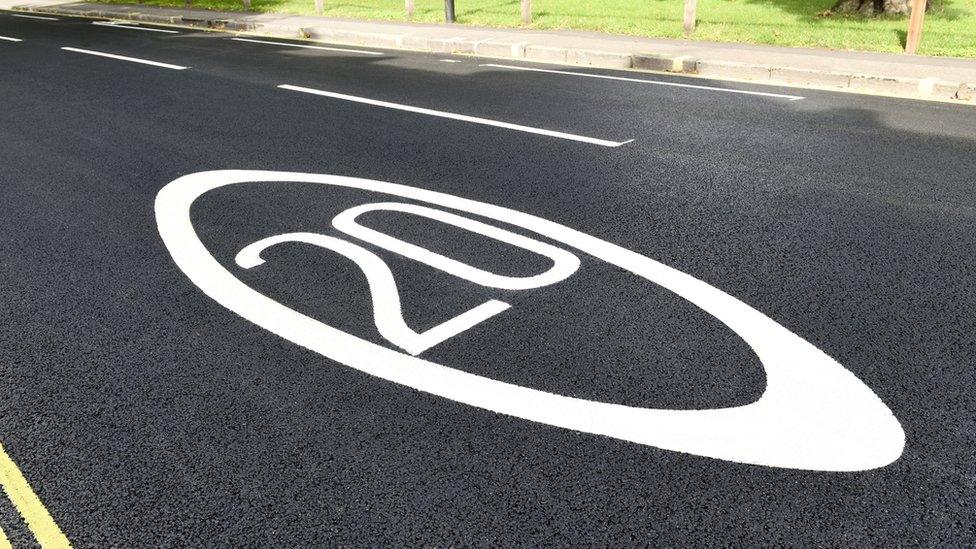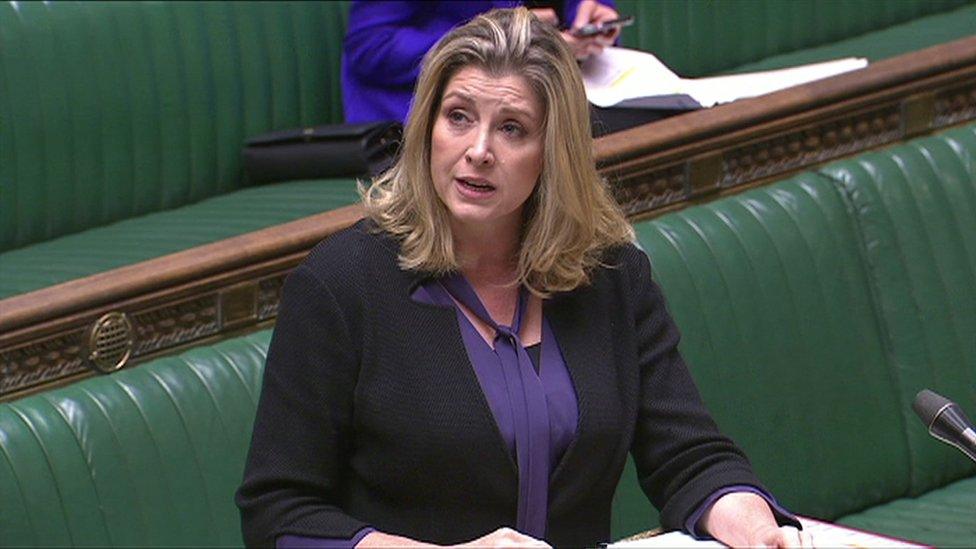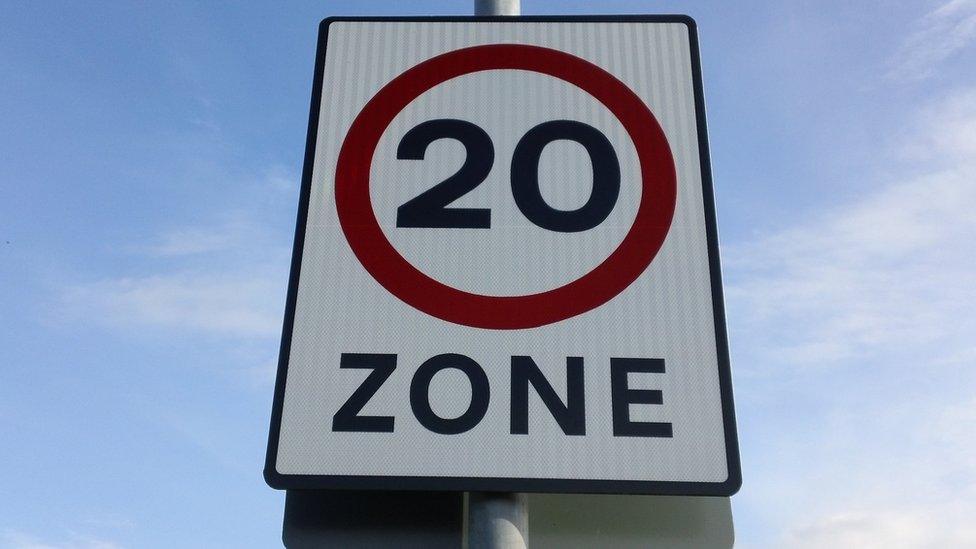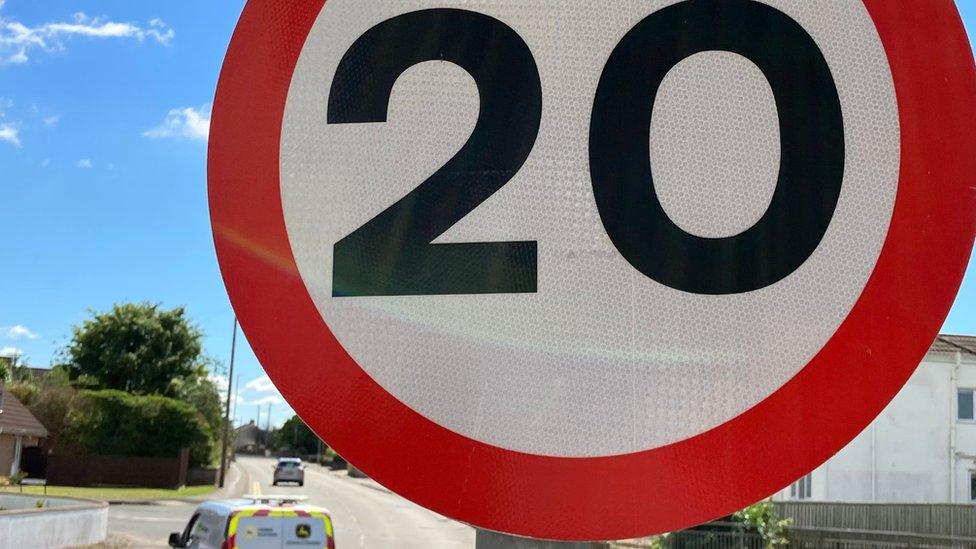Wales' 20mph limit absolutely insane, says Penny Mordaunt
- Published

The new 20mph speed limit for Wales' residential roads is "insane", according to a UK cabinet minister.
Commons leader Penny Mordaunt called having such a limit as the default for many roads "crazy", but agreed there are places where 20mph is a good idea.
Ms Mordaunt went on to accuse Labour of "punishing" motorists.
The Welsh government says that cutting the speed from 30mph to 20mph on most residential roads would protect lives and save the Welsh NHS £92m a year.
Most roads in Wales that are currently 30mph will become 20mph from Sunday, although councils have discretion to impose exemptions.
Labour's First Minister Mark Drakeford has said it is the "right thing to do", citing a fall in urban road deaths in Spain after it made a similar change in 2019.
Speaking in the House of Commons, Conservative Ynys Môn MP Virginia Crosbie said: "The Labour government in Cardiff, supported by Plaid Cymru, will be introducing a blanket 20mph speed restriction in built-up areas across Wales from September 17.
"In many places - outside schools, outside hospitals - 20mph is appropriate.
"Does the leader of the house agree with many of my Ynys Môn constituents that this blanket approach will impact main roads and impact the Welsh economy?
"And will she make time for a debate on how we should be supporting the Welsh economy, not punishing it?"
Ms Mordaunt replied: "This is absolutely insane even by the standards of Labour's Welsh government.
"They have ignored businesses and they have ignored the public. They are pushing ahead with this scheme despite huge opposition to it and I think the latest estimate is it will cost the Welsh economy £4.5bn.
"But, more disturbingly, it is going to increase individuals' fuel bills considerably and actually be harmful to the environment.
"[Ms Crosbie] is right, there are circumstances where, of course, 20mph speed limits are a good idea, but having them as the default for many roads is crazy.
"Instead of punishing motorists, Labour should be focusing on fixing public transport, in particular the trains."

Penny Mordaunt was answering Business Questions in the Commons
Explaining the £4.5bn cost to the economy figure quoted by critics of the policy, the Welsh government writes on its website: "Our assessment shows that reducing speeds to 20mph can result in an average increase of one minute per journey, nine lives saved and 98 serious injuries prevented each year.
"Before the law was passed, we produced an impact assessment that considered all the potential costs. This was included in the explanatory memorandum.
"It included the costs of any delays to travel time. The method used is now under academic debate for its effectiveness when calculating small delays.
"So the estimated cost to the economy of £4.5bn over 30 years may not be an accurate reflection of the true cost. The slightly longer travel time was the only negative economic impact identified.
"It is estimated that the casualty prevention savings, including the reduced impact on NHS and emergency services, could be up to £92m every year."
Welsh Labour ministers dispute the suggestion that the speed limit reduction is a "blanket" policy, accusing Conservative politicians of making false claims because councils have imposed exemptions, meaning that the 30mph limit will stay on some urban roads on Sunday.
Not in England
Downing Street has ruled out introducing the 20mph speed limit in England.
No 10 was asked about the Welsh government's new law at the daily lobby briefing for journalists.
Asked if Rishi Sunak would consider rolling out the 20mph law elsewhere in the UK as suggested by the road safety charity Brake, the prime minister's official spokesperson said: "no".
Pressed if the prime minister had a message for Wales as the new law comes into force on Sunday, the spokesperson added that the matter had not been discussed.
"That's a devolved issue so I think it's probably one for the Welsh government," he said.
Mark Drakeford has promised to review the impact of this major change to roads policy Wales, in conjunction with local authorities.
Additional reporting from Shelley Phelps
Related topics
- Published13 September 2023

- Published12 September 2023

- Published23 April 2024
